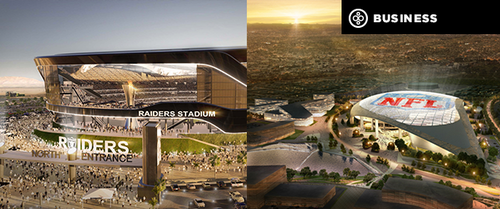Las Vegas oddsmakers are betting the New England Patriots will triumph over the Atlanta Falcons at Sunday’s 51st National Football League (NFL) Superbowl, but only by the slimmest of margins, giving the game the makings of a real nail-biter.

The NFL’s Oakland Raiders are confronting a nail biter of their own after plans to relocate the franchise to Las Vegas suffered a setback this week. At issue: funding for a new $1.9 billion stadium shared by the Raiders and the University of Nevada–Las Vegas. On Jan. 30, Las Vegas billionaire Sheldon Adelson announced his family was withdrawing its $650 million investment in the project. It didn’t take long for the other shoe to drop. On Jan. 31, the Los Angeles Times reported that an anonymous source close to the situation indicated that participation in the project by banking giant Goldman Sachs was “contingent” on Adelson’s involvement in it.

Just a week ago, relocation plans appeared all but sewn up. Las Vegas had succeeded in procuring $750 million in funds derived from a hotel tax approved by lawmakers and signed by Nevada Governor Brian Sandoval. The deal also called for the Raiders and the NFL to contribute $500 million to the project, due to open in 2020.
Further, the franchise was awaiting a late March vote by NFL owners on its relocation plans. The vote, requiring support from 24 of 32 owners, could face delay until a solid financial package is in place.
Conditions could deteriorate further if Raiders owner Mark Davis fails to quickly resolve the situation, according to Aaron Ford (D), the majority leader of Nevada’s Senate, who indicated that public funding for the stadium could be reallocated for other endeavors if current conditions remain in limbo.
In the meantime, Davis declined to comment on the situation as he and other stakeholders weigh their options, whether they involve seeking additional private investment for the Las Vegas stadium or remaining—and perhaps rebuilding—in Oakland.
The franchise has considered bolting Oakland for years due to a lack of public funding to replace the Oakland-Alameda County Coliseum, one of the NFL’s oldest and most decrepit stadiums.

An investment group including former Raiders player Ronnie Lott has floated a plan to construct a $1.25 billion, 55,000-seat stadium at the Coliseum site.
“We have a strong financing partner in Fortress Investment Group,” Lott’s group indicated in a statement. “We have an additional $100 million due to the NFL incentive to keep the Raiders in Oakland. Bottom line, if the Raiders want to say in Oakland, we are more than ready to be a partner in making that happen.”

Earlier this week, San Diego Mayor Kevin Faulconer reportedly spoke with an NFL official about the prospect of replacing the city’s outgoing San Diego Chargers with the Raiders franchise.
In early January, the Chargers indicated they were relocating to Los Angeles, where they will share a new $2.6 billion stadium with the re-anointed Los Angeles Rams, a franchise that is returning to its native turf after a 20-year stint in St. Louis.
The Chargers elected to pack their bags after voters rejected a November 2016 ballot initiative to raise hotel room tax rates from 12.5 percent to 16.5 percent to repay $1.15 billion in bonds for a new $1.8 billion San Diego stadium and convention center. Had the initiative passed, the Chargers and the NFL would have kicked in the remaining $650 million. Without public funding: L.A. or bust!
The Chargers had been eyeing Los Angeles for some time, having inked a deal with the Rams in January 2016 to split revenues pertaining to naming rights, suites sponsors, and advertisers if or when they share the Inglewood stadium. Rather than contribute to project costs, the Chargers have engaged in a tenant-lease agreement with the Rams. As planned, the Chargers and Rams separately will sell personal seat licenses totaling $700-800 million that will defray the construction costs of the new privately funded facility, due for completion in 2019.

“San Diego didn’t just lose the Chargers; the Chargers just lost San Diego.”
The move left Faulconer seething. Chargers owner Dean Spanos “made a bad decision, and he will regret it,” Falconer said at a press conference. “San Diego didn’t lose the Chargers; the Chargers just lost San Diego.”


Discussion
Be the first to leave a comment.
You must be a member of the BuiltWorlds community to join the discussion.